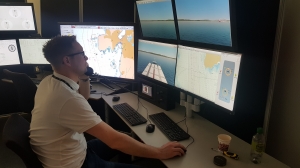


(Posted on 30/11/21)
Classification society DNV has introduced the shipping industry’s first competence standard for vessel remote control centre operators (RCCO). The standard is supported by a new recommended practice that offers a certification scheme for RCCOs. Together, they provide a framework for training, assessing, and certifying personnel working in remote-control centres that support or manage operations at sea.
Intelligent software systems and enhanced ship-to-shore-connectivity have laid the groundwork for the growth of remote solutions and autonomy in shipping. Unmanned vessels are already expected to begin operations in the near future.
Ensuring that these vessels operate at an equivalent level of safety is essential to building confidence and realizing the potential of these technologies. However, despite the technical solutions being in place, competence requirements for those monitoring, supporting and/or controlling these ships have not been defined.
The new DNV competence standard for remote control centre operators (DNV-ST-0324) and the supporting recommended practice (DNV-RP-0323) change this. They were developed in collaboration with Kongsberg Maritime, Wilhelmsen, as well as the University of South-Eastern Norway, and the Norwegian Maritime Authority.
“Making sure that shore-based staff are prepared for autonomous, remote-controlled or remotely supported operations at sea is a big challenge,” said Torsten Schröder, SeaSkill™ Service Manager, Competence & Learning at DNV Maritime. “Because when it comes the wider application of these technologies, trust in the systems, and the people managing these operations is paramount. This is why we are so pleased to have developed the RP with expert partners from across the industry. Having a wide range of expertise was essential to devising a uniform and controlled approach to the training, assessment and certification of RCCOs.”
The recommended practice, DNV-RP-0323, gives guidance to centres conducting examinations of remote-control centre operators and issuing personnel certificates as a certification body. It also covers the competence building process for candidates before undertaking an RCCO examination, for example learning programmes and practice sessions in the centres themselves.
The DNV SeaSkill standard ST-0324 provides a foundation for the entire process. It lists the required competencies for the operation of autonomous or remotely controlled and/or supported ships.
DNV is the world’s leading classification society and a recognized advisor for the maritime industry. We enhance safety, quality, energy efficiency and environmental performance of the global shipping industry – across all vessel types and offshore structures.
We invest heavily in research and development to find solutions, together with the industry, that address strategic, operational or regulatory challenges.
Columbia Group anticipates a period of strong expansion as an increasing number of international shipowners... Read more
Norse?Ship Management has expanded its use of Smart Ship Hub’s high frequency sensor data and... Read more
As the maritime industry gears up to welcome the IMO’s STCW bullying and harassment training amendments... Read more
NORDEN has acquired the cargo activities of Taylor Maritime in Southern Africa (previously operated... Read more
Philippos Ioulianou, Managing Director of EmissionLink, has warned the IMO’s decision to delay... Read more
VIKAND has highlighted the need for cultural change in the maritime sector as reports of bullying, harassment... Read more
The maritime industry is experiencing a period of significant transformation, driven by rapidly evolving... Read more
NorthStandard has advised Members of a 5% increase in P&I premiums for the marine insurance year... Read more
Anemoi Marine Technologies, the UK-based leading designer of Rotor Sails for wind-assisted ship propulsion... Read more
Helm Operations has announced that nine electronic record books within Helm CONNECT Logbook have been... Read more